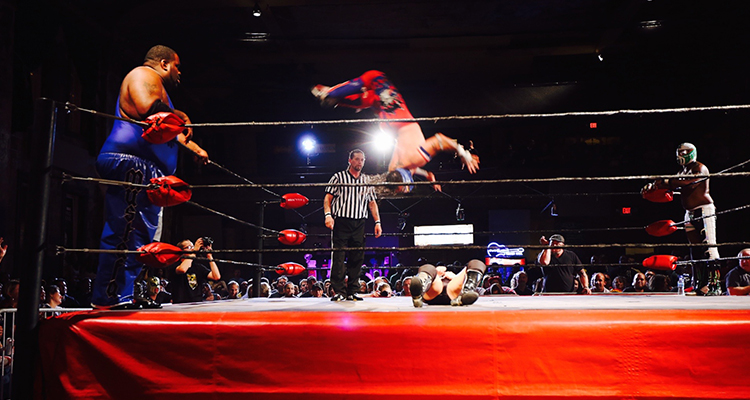At this point, Mondo Lucha is one of those distinctly Milwaukee events. Though some may struggle to recall a time before Turner Hall was transformed into a wrestling and variety show facility, the local blend of lucha libre wrestling, burlesque, sketch comedy, and music has only been around since 2008. Before the seventh installment of Mondo Lucha hits the mats on Friday, Milwaukee Record spoke to co-founder and producer Andrew Gorzalski about the local staple’s formation, its influences, and the desire to “create unironic, pure entertainment that’s just fun.”
Milwaukee Record: You’re entering year seven of Mondo Lucha. What was the origin, like, what led to you wanting to begin this thing?
Andrew Gorzalski: My partner, Jay Gilkay, and I, we were lifelong wrestling fans and watched it in an ironic, but also very genuine way. We also love the conventions of pro wrestling, and the storytelling. As time went on through the 2000s, we felt like there was almost too much reality put into things. Mainstream wrestling like the WWE started just being guys in jean shorts with just regular names like John Cena. In the ’80s it was more like cartoon characters with colorful adjectives, like Jake “The Snake” Roberts. We felt there was a lack of pure fun in wrestling. Some filmmakers will stay they started filmmaking because they didn’t want to see any movies, so they wanted to make something they’d like to see. I think we have a little bit of that motivation and urge with Mondo Lucha.
MR: What has the evolution been over the years? Were the first years really hard to field and audience? I guess, in what ways has the show changed over the years?
AG: The main formula has kind of stayed the same with a musical guest that, like SNL, will come out a couple times to play a song. It kind of bounces from comedy stuff, wrestling matches, a burlesque performer, a musical guest, and goes through this weird formula—non-stop for about two and a half hours. The main skeleton of the show has always been there, I just think we’ve gotten better at maintaining the pace.
MR: Is there any other variety shows that you sort of used as the basis for the format?
AG: Well, there’s [Lucha Libre] AAA out of Mexico. There’s a lot of Lucha Libre aspects that are incorporated, where it’s way more high-flying and aerial. There’s a show out of Los Angeles called Lucha VaVOOM, which kind of had a run for a while. They had burlesque people and was kind of amplified Mexican pro wrestling. I’m not going to say they’re Jay Leno because that would be bad, but there’s a kind of Leno-Letterman thing, where there are these two flavors of shows. I feel like the Lucha VaVOOM audience is looking at a spectacle of pro wrestling from afar, almost like how you’d look at an animal, like, “Look at that bear.”
MR: And your show is more inviting?
AG: And this more like getting in the cage with the bear and roll around. The audience at Mondo Lucha is part of the show. I feel that there is some irony with what we do, but I want us to create unironic, pure entertainment that’s just fun. That almost doesn’t exist anywhere in modern entertainment.
MR: Yeah, at most shows, you’re not really encouraged to yell things at the performer and chant things at a common enemy that you just realized you all had only minutes earlier.
AG: Everything gets sketched out pretty quickly for the audience, like what the story is and where it’s going to go. It’s like a weird opera, where sometimes the good guys don’t always win. There’s a lot of thought put into the storytelling. We’re kind of playing with the pillars of the psychology of pro wrestling.
MR: And this year’s musical act is Whips? I think it’s going to one of their last local shows of the year.
AG: Yeah, I’m super excited. It feels like they haven’t played out leading up to this, so I think there will be a sense of urgency to come see them.
MR: Other than very occasional one-off events, this is a once a year spectacle. How much work goes into it? When do you begin?
AG: We’ll begin maybe five months out to really get serious about writing the storyline for the shows, and based on the level of our performers, you have to book that far in advance. We start to put all the pieces together in the spring. Then we just sketch out some big moments and reverse-write the story to make all those things happen.
MR: In what ways will this show be different than previous years?
AG: We’ve changed the format and order a little bit. Instead of just taking the same thing, we’re going t play with the order of things and how we bring things out. It’s funny, we have a number of things happening that are definite surprises. I can’t really talk about that, other than saying it’s going to be crazy and fun.
Our whole goal when we started this was to make a really crazy parody that our friends would laugh at. That was a worthwhile reason to do it. Shortly after that, the response was so positive with people that our goal was to be something that people pencil in on their calendar every year, like the PBR Fest at Burnhearts or the people that look forward to Bastille Days. You can almost tell time in Milwaukee by what’s going on. If we can somehow work our way to being one of those things, then I think we have succeeded.

